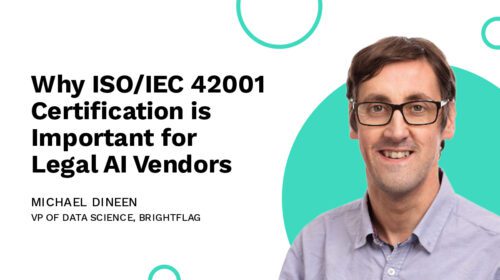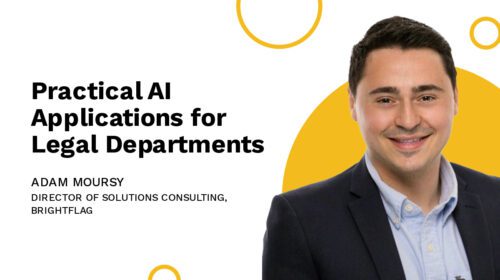A Guide to Ensure Data Compliance in Legal Ops Tools
Modern companies rely on thousands of software tools and applications to keep the business running.
A single vulnerability in any of these tools can open the floodgates to data breaches, putting your entire operation at risk. Your data security, as they say, is only as strong as your weakest link. Cybersecurity isn’t just about fortifying your own defenses; it extends to every software tool your company uses.
So, as your legal ops team considers its next legal tech investment, you need to have the information to ensure your technology partners take data compliance regulations as seriously as you do. Because they’re not just protecting your sensitive data. They’re safeguarding your reputation.
What is Data Compliance?
Data compliance is all about the policies your organization establishes around gathering, storing, tracking, using, and protecting personal data from clients, customers, users, and site visitors.
Those policies must adhere to an evolving regulatory patchwork of local, national, and international laws, such as the General Data Protection Regulation (GDPR), the California Consumer Privacy Act (CCPA), and industry-specific regulations such as the Health Insurance Portability and Accountability Act (HIPAA). While the specifics of each differ slightly, each is designed to protect people against the loss, theft, misuse, and mishandling of their data.
These laws don’t just protect consumers. They also govern employee data and the data in business relationships, like those between in-house counsel and their technology providers.
Why Does Data Compliance Matter?
Employees, customers, and business partners are more aware of data privacy concerns than ever before. Ensuring your company (and the third-party vendors who serve you) meet stringent data compliance standards is no longer something to brag about; it’s the baseline expectation.
Hacks and data breaches cost U.S. companies an average of $9.5 million per incident, according to a 2023 IBM report. More sobering, and harder to quantify, is the reputational damage and broken customer trust those companies suffer from poor data management.
Implementing data compliance serves your organization beyond matters of prevention. Meeting the certification and accreditation standards of the various data compliance requirements provides a blueprint for your organization to systematize how it gathers, processes, and stores data. That leads to high-quality, consistent data that you can use to make more informed decisions about your company’s future.
Critical Data Compliance Standards
There’s a cacophony of different compliance standards based on the needs of different industries, the regulations of different countries, and the best practices of different information technology associations. However, SOC 2 Compliance and ISO 27001 Compliance are important because they are internationally recognized, carefully-documented, and independently verified.
SOC 2 Compliance
A company achieves SOC 2 compliance to show it can defend against cyber attacks and security breaches.
Before contracting with a third-party vendor, you should confirm they have this American Institute of Certified Public Accountants (AICPA) certification from a recent CPA audit.
During their audit, CPAs check that a company explicitly and transparently describes how they collect customer data, what kinds of data they collect, and how they use that sensitive information.
Next, CPAs ensure safeguards such as granular access controls are in place to monitor data and detect any unauthorized access. Access controls ensure that only approved staff can physically or digitally access data.
As part of the compliance program, CPAs also review the company’s information technology plans to make sure a plan exists to respond swiftly to an incident and mitigate the fallout.
ISO 27001 Compliance
ISO 27001: 2013 is a widely recognized international standard for managing information security. It provides a systematic approach to managing sensitive company information so that it remains secure. This involves people, processes, and IT systems by applying a risk management process.
Companies must conduct thorough risk assessments to identify potential threats to their data and information systems. They need to implement appropriate risk management strategies to mitigate identified risks, ensuring the confidentiality, integrity, and availability of data.
ISO 27001 requires the establishment of an Information Security Management System (ISMS), which includes defining roles and responsibilities related to information security. This structure should ensure adequate oversight and management of information security issues within the company.
To meet ISO 27001 standards, companies must undergo a rigorous external audit performed by an accredited certification body. This audit assesses whether the ISMS complies with the standard’s requirements and involves an extensive review of the organization’s information security policies, procedures, and practices.
Achieving ISO 27001 certification demonstrates a commitment to information security at all levels of the organization and can significantly enhance a company’s reputation, build customer trust, and provide a competitive advantage. Additionally, it helps in aligning with global data protection regulations, including GDPR.
Important Data Privacy Laws to Be Aware Of
In addition to compliance standards, there is a variety of data privacy laws that you and your vendors should be aware of.
General Data Protection Regulation (GDPR)
GDPR is one of the most comprehensive data privacy laws. It was established by the European Union (EU), but its reach is global. This is because a business becomes subject to the law any time the organization collects, processes, or stores the personal data of EU citizens — even if the organization has no physical presence in the EU.
Compliance with GDPR requires protection of “personal data,” which is defined very broadly. It can include any information that could be used to identify a person on its own or in conjunction with other information.
Personal data subject to GDPR is often found in legal invoices, contracts, and documents. It is vital that you identify where protected data is held in your legal department, as well as with vendors that store personal data on your behalf. Ask to see your vendor’s policies on:
- How data is stored and processed
- When data is deleted
- Where data is stored and customer choices for venue
GDPR requires all holders of protected personal data to implement seven principles of data protection and facilitate personal data protection in line with consumer privacy rights. Failing to comply with GDPR can lead to significant fines. In 2023 alone, over €4.4 billion in fines were imposed for GDPR violations. The largest individual fine to date went to Meta at €1.2 billion.
California Consumer Privacy Act (CCPA) and California Privacy Rights Act (CPRA)
Together, CCPA and CPRA form the most robust consumer privacy protection in the United States. The laws apply to any for-profit business that collects or sells data about California residents. As with GDPR, the determining factor for jurisdiction is where the owner of the personal data resides.
The compliance requirements for CCPA and CPRA are very similar to those of GDPR. For example, privacy policies must be established that:
- Describe consumer rights, including rights to opt out of data collection
- Define the categories of data collected
- List categories of data sold or disclosed in the prior 12 months
Additionally, qualifying businesses under the law must implement a training program for any employees designated as protected personal data handlers.
Health Insurance Portability and Accountability Act (HIPAA)
HIPAA is a US law that specifically applies to personal health information (PHI), most commonly held by healthcare organizations. The law established the HIPAA Privacy Rule, which prohibits the sharing or selling of PHI. Any data that identifies an individual’s health information can be considered PHI.
Compliance with HIPAA begins with identifying where your organization collects or stores PHI. This extends to understanding how your vendors hold or process that data. Ask to see their policies for HIPAA compliance, which may be separate from other data privacy policies.
Other Data Privacy Laws
Many other countries have adopted data privacy laws with requirements similar to GDPR. In most cases, this means they reach beyond their borders if the personal data at issue belongs to one of their citizens. These countries have each adopted their own laws:
- Canada – Personal Information Protection and Electronic Documents Act (PIPEDA)
- Brazil – General Data Protection Law (LGPD)
- China – Personal Information Protection Law (PIPL)
- Singapore – Personal Data Protection Act (PDPA)
- South Africa – Protection of Personal Information Act (POPIA) and Promotion of Access to Information Act (PAIA)
What You Need to Know About Your Tech Provider’s Policies and Controls
If you’re planning to add new legal tech in the near future, your IT or information security team will likely want to review the tech provider’s data compliance policies and practices. It’s best to anticipate this necessary step in the buying journey and to let the relevant teams know ahead of time when you’re planning to make a purchase.
The legal tech provider should assist in this process by being able to quickly provide you with documentation of all of their data compliance certifications, such as SOC2 and ISO 27001, and their data governance policies and controls during the sales process. That documentation should cover:
Data Protection
This policy governs data collection, data storage, and data use. Businesses should aim to collect only the data necessary to achieve their goal and no more. They should also not store that data for longer than necessary.
Risk Management
Providers must show they proactively address risks and vulnerabilities they discover in their platform. Those actions include encrypting data, installing firewalls, and updating software with security patches and other upgrades.
Many organizations also institute employee training to teach them how to avoid phishing and other scams. Businesses should also regularly inventory and back up their data collection.
Finally, your legal tech vendor shouldn’t treat risk management as a task that’s ever complete. They need to show they regularly review their security measures and privacy controls.
Incident Response
Despite the best efforts of even the most diligent IT team, data breaches can happen.
Every provider you consider must have an organized strategy for minimizing the damage in the event of a data incident and, if necessary, getting operations up and running again.
An incident response plan must outline the types of incidents that require action, what those actions are, and the roles and responsibilities of those that will carry out those actions.
The response to most incidents will be first to contain the threat so it can’t do further damage. Then, the IT team will work to eradicate the threat. In the aftermath, the organization will recover all the data it can and notify customers and other stakeholders.
Your vendor should review, test, and update this plan often in light of changing technology and new security threats.
In-App Functionalities To Look For With Your Vendor
After you’ve reviewed your vendor’s certification and internal best practices, it’s time to turn your attention to the controls available at the user level within your vendor’s application. You need the ability to restrict which of your users access what information to ensure data compliance. You should also have the ability to look back and see who took a given action and when.
Granular Access Controls
Your legal tech software should empower you to follow the principle of least privilege. This principle states that administrators give users the minimum access necessary to do their jobs. So, users only see what they need to see and no more. Similarly, access controls let you control who can view, comment on, or edit data.
Administrators can grant that access based on standard user roles or custom permissions.
For example, Brightflag comes out of the box with user roles like administrator and ordinary user. An administrator can perform most actions in Brightflag. An ordinary user can only perform limited actions, such as approving invoices and editing matters assigned to them. However, you can make custom permission sets that give certain users access to a blend of administrative and ordinary user functionalities.
Audit
Your legal tech provider should record audit trails that you can review.
Audit trails act as a comprehensive digital ledger that provides transparency and oversight over all activities within a system. Their role is essential in maintaining the integrity of data, ensuring compliance with policies and regulations, and safeguarding against malicious activities.
Audit trails keep track of who accesses data and what changes are made. This can quickly reveal unauthorized access or modifications to data, which could indicate a data breach or misuse.
Audit trails also reveal who was involved in the processes or actions that led to an error. This can be crucial for addressing training needs, updating procedures, or taking corrective actions.
By regularly reviewing audit trails, anomalies or unusual patterns can be detected. For instance, if a user accesses sensitive data outside of their usual working hours or modifies data they typically don’t interact with, it can trigger an investigation.
Brightflag Takes Data Compliance Seriously
Data compliance will become increasingly important as more governing bodies formalize data protection practices into privacy regulations, laws, and mandates.
Now is when you should assess your current legal ops tools for regulatory compliance and consider upgrading or switching if necessary.
Brightflag is GDPR, CCPA, and CPRA compliant, ISO/IEC 27001:2013 certified, and SOC 1 and SOC 2 compliant. We provide a Trust Center with all the information you and your IT and information security teams need to understand our security policies and controls because we value transparency and security.
Ready to learn more about why leading legal ops teams choose Brightflag? Book a demo today.



